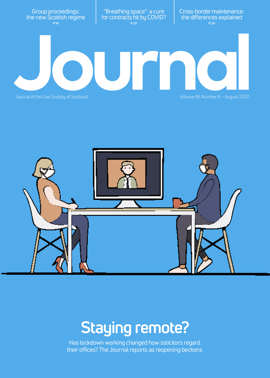Family: When experts miss the mark
The recent decision of Lady Wise in SMA v MMA [2020] CSOH 54 (28 May 2020) highlights the importance of getting the instruction of your expert witness right and ensuring they are provided with all the salient information before they give evidence. This was a particularly complex case because of how the assets were held, which meant that expert evidence was central to the dispute.
Mr and Mrs A had been married for 29 years. Throughout their marriage Mr A operated a number of restaurants and invested in commercial property, such that at separation the matrimonial property was worth in excess of £10 million, the vast majority of which he owned. Mr A held his assets in shares in a holding company, as an individual/sole trader, and as part of a partnership with his elderly father. He operated each restaurant through a limited company, each company’s shares being owned by the holding company. Money was freely moved around by way of inter-company loans on Mr A’s instruction as and when cash flow dictated a need.
Mr A argued that each business had to be valued within that structure, including valuing some restaurants on the basis that they were merely tenants even though Mr A was the landlord. Mrs A led evidence from C, an expert surveyor, specialising in the restaurant and licensed premises trade, and argued that Mr A was the “controlling mind” of all the businesses and therefore the court should collapse the corporate structure, combining Mr A’s interest in the heritage business assets into one as that was within Mr A’s power, apart from one property owned with his father as trustees for the partnership with him and leased to one business. In respect of that property, it was argued that the father would likely agree to a sale on a willing seller-willing buyer basis as he would be unlikely to stand in his son’s way if he wanted to sell. Mr A senior’s share would be accounted for in the valuation.
Independent expert?
Mr A led evidence from his own expert surveyor R, who did not assess the group of businesses as a whole but valued them as individual going concerns on leasehold at lower values and the heritage separately. During the proof, R accepted that he had issued terms of engagement to Mr A in the format of agent/client and not as a professional expert witness whose primary duty was to the court. R’s report was absent the usual statement about being independent with a duty to the court, and his letter set out a client complaints process for his firm, which would not apply to a surveyor acting as an expert witness. R had also accepted instruction to conduct a valuation for Mr A’s bankers after the proof for the purpose of raising capital to pay Mrs A, which he had factored into his quote for his services.
After C’s evidence had been led, R had met with Mr A and his representatives and subsequently reviewed downwards the multiplier he had used, saying he had been further convinced of Mr A’s “remarkable contribution” to the business and that it had been understated in his valuation, even though R accepted he had never come across such a concept in any previous valuation and that account had already been taken in valuing the fair maintainable operating profit under a reasonably efficient operator (REO) on the assumption that Mr A left the business on sale. R was seeking to factor in something on the basis that Mr A’s contribution was so stellar that the REO assumption was simply not adequate to reflect the impact of Mr A’s departure on profit.
For Mrs A it was argued, under reference to the approach in Kennedy v Cordia (Services) 2016 SC (UKSC) 59, that R’s evidence could not be described as impartial and that he had effectively acted as an advocate for Mr A.
No reliance
Rejecting R’s evidence and accepting C’s, Lady Wise decided: “In light of the unsatisfactory nature of [R’s] change of heart on valuation, the backdrop of the absence in his report to his duties to the court and the other errors mentioned take on more significance than they might have otherwise. I do not doubt [R’s] general motivation of course, but in light of the evidence about how his views developed I consider that he has allowed himself to be influenced by [Mr A’s] views on the matter. As a result, he departed from the necessary position of impartiality of a witness giving opinion evidence and appeared to promote the defender’s cause on valuation… I am effectively left with no definitive valuation by [R]. For all these reasons I have concluded that I cannot rely on his evidence at all and so cannot use any of his figures for the purpose of valuing the various business interests.”
It further transpired that Mr A’s expert forensic accountant, valuing the shares in the corporate entities, had relied on R’s valuations, was unaware of certain figures which had since been agreed between experts during proof and had not considered all the other reports, and so his evidence had to be disregarded also.
This case illustrates the importance of demonstrating the independence of your expert witness at proof. It is also notable for the application of an unequal sharing of the value of the net matrimonial property, based on a 58:42% split to account for source of funds arguments. That will be seen as a shift from the more recent reported cases which have evaluated source of funds more forensically and deducted from the net value to be shared.
Regulars
Perspectives
Features
Briefings
- Criminal court briefing: Coronapocalypse?
- Employment: Unfairly anonymous?
- Family: When experts miss the mark
- Human rights: Judicial review refusal does not need oral hearing
- Pensions: Members' benefits: compensation and protection action
- Scottish Solicitors' Discipline Tribunal
- Property: Code to recovery
- In-house: “So, how are you?”







